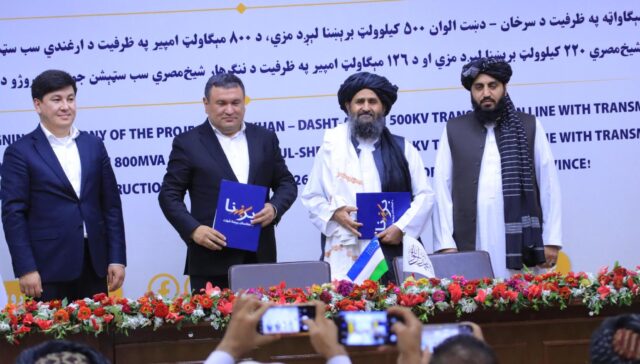
Uzbekistan Strengthens Energy Partnership With Afghanistan
Publication: Eurasia Daily Monitor Volume: 22 Issue: 144
By:

Executive Summary:
- On October 6, Uzbekistan signed a 25-year, $100 million-per-year contract with Afghanistan to explore and develop Afghan oil and gas resources, expanding economic cooperation and processing extracted gas in Uzbekistan for mutual benefit.
- Kabul and Tashkent have strengthened energy ties through major infrastructure projects, including new transmission lines and substations, with agreements totaling over $1.15 billion to expand electricity generation and connectivity.
- Uzbekistan’s growing role in Afghanistan’s energy sector supports regional integration, stability, and its strategic goal of accessing seaports via Afghanistan, despite ongoing geopolitical challenges and Russian influence in the region.
On October 6, Uzbekistan Energy Minister Jurabek Mirzamakhmudov revealed that Uzbekistan had signed a 25-year contract with Afghanistan for the exploration and development of oil and gas resources in Afghanistan. In September, Uzbek company Eriell KAM started exploration work at the Tuti-Maidan gas field in Afghanistan (Kursiv.uz, October 6). Mirzamakhmudov stated that this initiative will bring mutual economic benefits to both Uzbekistan and Afghanistan (Kun.uz, October 6). Under the deal, Uzbekistan agreed to invest around $100 million per year over the next 10 years. Afghanistan’s Toti-Maidan gas field contains nearly 30 wells, and extracted gas will be processed in Uzbekistan (The Diplomatic Insight, October 9). Uzbekistan is increasing its stake in Afghanistan’s energy sector as part of its strategy to deepen regional energy partnerships and create mutually beneficial economic opportunities (see EDM, May 21).
Uzbekistan has witnessed a 38 percent rise in electricity production from 59 billion kilowatt-hours (kWh) in 2016 to 81.5 billion kWh in 2024 (Times of Central Asia, September 29). Afghanistan meets 80 percent of its electricity needs through imports from neighboring countries, including Uzbekistan (Tolo News, December 17, 2024). Uzbekistan began supplying electricity to Afghanistan in 2002. By the end of 2019, the volume of electricity supplies to Afghanistan grew from 62 million kWh to 2.6 billion kWh. In 2023, Uzbekistan supplied 1.82 billion kWh of electricity to Afghanistan. In December 2023, both countries extended their electricity supply deal for 2024 (Gazeta, December 19, 2024). In 2017, Uzbekistan and Afghanistan agreed to construct a 260-kilometer (160-mile) 500 kV Surkhan–Pul-i-Khumri power transmission line to increase electricity supplies from Uzbekistan to Afghanistan by 70 percent (see EDM, December 13, 2017). In September 2019, both countries signed a 10-year contract for electricity supplies from Uzbekistan to Afghanistan. Under the agreement, the initial supply volume was increased from 4.2 billion kWh to 6 billion kWh (Gazeta, September 21, 2019).
In August 2024, Uzbekistan and Afghanistan signed five deals worth $1.15 billion in the energy sector. The deals included the geological survey of hydrocarbon reserves in the Afghan–Tajik oil basin, the gas-based generation of 120 megawatts (MW) of electricity, and the geological study of the Toti Maidan gas field reserves in Afghanistan (Ariana News, August 26, 2024; Times of Central Asia, August 27, 2024). In December 2024, Tashkent and Kabul signed a deal for electricity supplies. The deal opened new opportunities to expand supply volumes and develop joint energy projects. The deal was signed between Uzbekistan National Electric Networks and Afghanistan’s state-owned energy supply company Da Afghanistan Breshna Sherkat (DABS). Kabul also settled its two-year debt for electricity supplies to Uzbekistan and paid Tashkent $86.9 million in May 2024 (CentralAsianLIGHT, December 19, 2024).
In August, Uzbekistan’s Ministry of Energy and Afghanistan’s DABS signed four contracts worth $243 million to expand power transmission infrastructure and build new substations (X/@dabs_official, August 17). Under the deal, the 500-kilovolt Surkhan–Dasht Alwan transmission line will be extended to carry up to 1,000 MW of electricity (Times of Central Asia, August 18). The project also includes an agreement to expand the Arghandeh substation to 800 megavolt-amperes. Uzbekistan and DABS agreed to build a new double-circuit 220 kilovolt (kV) transmission line measuring 125 kilometers (77.7 miles) from the Butkhak substation in Kabul to the Sheik Misri substation in Nangarhar, Afghanistan. Both parties agreed to construct the 220 kV Sheik Misri substation in Nangarhar (Interfax, August 19). Besides the four deals, DABS, in a move to stabilize Afghanistan’s power grid, also signed an agreement with Uzbekistan to purchase electricity for ten years. Presently, Afghanistan generates 250 MW of electricity domestically, and its imports from Turkmenistan, Iran, Uzbekistan, and Tajikistan stand at 800 MW, costing it $250–280 million per year (Times of Central Asia, August 18).
In September, Uzbekistan and Afghanistan signed a financial agreement, which marked a new phase in their bilateral energy relations. Under the agreement, the high-voltage power transmission lines and substations ranging from 220 to 500 kV will be built across Afghanistan (One.uz, September 7).
The establishment of electrical infrastructure, particularly high-voltage power transmission networks and substations, is a method for Uzbekistan to help Afghanistan develop its energy system and strengthen regional cooperation. Moreover, a long-term energy partnership with Afghanistan will ensure stable energy supplies from Uzbekistan (One.uz, September 7). Improved infrastructure and stability in Afghanistan are critical to Uzbekistan’s shortest access to regional seaports and new opportunities for transit and logistics.
There are several challenges on the security and geopolitical fronts that are hampering Uzbekistan’s ambitious plans to gain access to the ocean through Afghanistan. In July, Russia became the first country in the world to formally recognize the Taliban regime in Afghanistan (TASS, July 3; see EDM, July 23). Moscow is ambitious to become a key player in Afghanistan to maintain and expand its influence in South and Central Asia. Geographically, Afghanistan acts as a bridge between the two regions, and major connectivity and infrastructure projects between South and Central Asia would have to pass through it. Afghanistan has the potential to emerge as a transport hub in the region and a useful path for Uzbekistan to larger markets.



